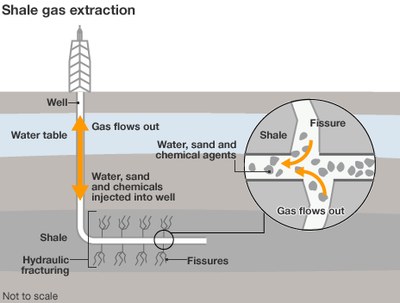Today is indeed a dark day, where frackers win and citizens and the environment lose.
Jan 22, 2014
The Commission's Impact assessment on shale gas, released today along with recommendations, a communication and a citizens' summary, looked at 5 scenarios:
- Option 0: Business as usual (baseline)
- Option A: Recommendation, guidance and voluntary approaches
- Option B: Amendments of parts of the EU environmental acquis (integrating elements of option A)
- Option C: Goal-setting legislation (Framework Directive) building on the EU environmental acquis (integrating elements of options A and B)
- Option D: Legislation setting specific provisions (Directive) (integrating elements of option A)
What we have today is Option A which we can argue is more or less Option 0, business as usual, when we read this assessment:
"This option would not provide a legal basis for eg, addressing cumulative impacts, mandatory disclosure of chemicals, nor for the mandatory capture of gas nor independent evaluation and verification of the well integrity. All the other identified problem areas would be tackled in a non-prescriptive way. The implementation of measures not mandated by EU law would remain entirely voluntary."
(http://ec.europa.eu/environment/integration/energy/pdf/ia_en.pdf pg45)
Options B, C and D would all have been more preferable
Option B suggests to amend: the Environmental Impact Assessment (EIA) Directive (depending on result of trilogue negotiations), the Mining Waste Directive (MWD), the Industrial Emissions Directive (IED)
Option C a single act with goals which 'would cover the basic steps that experts recommend to systematically implement', would build on existing legislation and provide amendments to MWD and IED, with implementation to Member States
Option D's main difference to C is it would come forward with provisions covering both general principles and objectives and specific detailed obligations. It would ' not rely on the IED and would restrict the applicability of the MWD to waste management on the surface.'
In analysis of the effectiveness of the Options:
3 taken together as results all the same
1) For preventing, managing and reducing environmental impacts and risks, 2) For providing legal certainty and predictability to competent authorities and operators, 3) In responding to public concerns
Option A = low
Option B = good
Option C = high
Option D = very high
Enforceability: A none, B, average, C good, D high.
Stakeholder positions: Option A: Oil and gas industry as well as chemicals industry are in favour.
Costs for operators of option A: ranging between zero, up to costs of option B.
Annualised compliance costs as a percentage of expected annual revenues on the basis of the current gas price of € 0.43/m3:
- Option A 0 to 1.4 %
- Option B 1.4 %
- Option C 1.4% to 1.6 %
- Option D 1.6%




